(RSF/IFEX) – Reporters Without Borders has hailed the reopening of the investigation into the death of TV cameraman Brian Peters, a member of a group of five journalists of Australian, New Zealand and British nationality who were killed by Indonesian soldiers and paramilitaries in East Timor in October 1975. “This new investigation 30 years after […]
(RSF/IFEX) – Reporters Without Borders has hailed the reopening of the investigation into the death of TV cameraman Brian Peters, a member of a group of five journalists of Australian, New Zealand and British nationality who were killed by Indonesian soldiers and paramilitaries in East Timor in October 1975.
“This new investigation 30 years after the events offers an historic opportunity to shed light on the death of five reporters who were key witnesses of the Indonesian army’s invasion of East Timor,” the press freedom organisation said. “The occupation and subsequent liberation of this former Portuguese colony were marked by serious human rights violations, including the deaths of journalists.”
Reporters Without Borders added: “It is time the Indonesian army agreed to provide information about those suspected of being responsible, even if they were military personnel. We call on the governments concerned, above all the Indonesian and Australian governments, to cooperate in this so that the families can finally obtain justice.”
On 5 February 2007, the coroner’s court of Glebe, a suburb of Sydney (New South Wales), opened an inquest into Peters’ 16 October 1975 death in the East Timor border town of Balibo. A 26-year-old British cameraman working for the privately-owned Australian TV station TCN-9, Peters was a New South Wales resident.
The court was told of the failure of the various judicial procedures undertaken in this case since 1975. Describing the inquest as the first enquiry to be conducted in Australia in an “open, public and completely independent” manner, the assisting counsel referred to the findings of the East Timor Truth and Reconciliation Commission that the journalists were murdered and were not killed in crossfire. Testimony will be heard from Australian and Timorese witnesses, but all the Indonesian officials and military personal who were asked to testify refused.
The inquest, which is expected to take three weeks, will examine among other things whether the Australian authorities, including former Labour Prime Minister Gough Whitlam, now aged 92, were aware of an order to eliminate the journalists after Indonesian army communications were intercepted.
Shirley Shackleton, the widow of one of the journalists killed with Peters, Australian Greg Shackleton, told Reporters Without Borders: “All that we learn about Brian will help us to shed light on the other four (. . .). The families have been calling for a special inquest into this case for the past four years. The arrival of a new coroner helped to get things going.”
Peters and Shackleton are two of the so-called “Balibo Five”, a group of five journalists working for two Australian TV stations who were killed in Balibo by Timorese paramilitaries and Indonesian troops preparing for a full invasion of the territory on 7 December 1975.
Shackleton, Australian soundman Tony Stewart and New Zealander cameraman Gary Cunningham worked for Melbourne-based HSV-7. Peters and British reporter Malcolm Rennie worked for Sidney-based TCN-9. Another journalist, Australian Roger East, was killed on 8 December 1975.
There have been many abortive attempts by the Australian government to inquire into the journalists’ deaths. Attempts in 1975, 1976, 1996 and 1999 – including through the Australian embassy in Jakarta – all failed.
Members of the Historical Crime Unit formed by the United Nations Transitional Administration in East Timor (UNTAET) began an investigation into their deaths in 2000 and the UN issued international arrest warrants for three Indonesians, including former cabinet minister Yunus Yosfiah, on 3 February 2001. The warrants were never executed. The same year, UNTAET chief Sergio Vieira de Mello requested permission from the Indonesian interior minister to question nine suspects in connection with the case. This request was also turned down.
The failure of all the previous attempts was due above all to the Indonesian government’s refusal to provide information about the fate of the journalists’ bodies – which were thought to be buried or burned without any autopsy being carried out – and the inability to question the key protagonists, who are clearly trying to evade Australian and international justice.
The names of Peters, Rennie, Shackleton, Cunningham, Stewart and East are to be inscribed on the Memorial for Journalists killed since 1945, which Reporters Without Borders and the Bayeux City Hall in France will formally inaugurate in May 2007.


